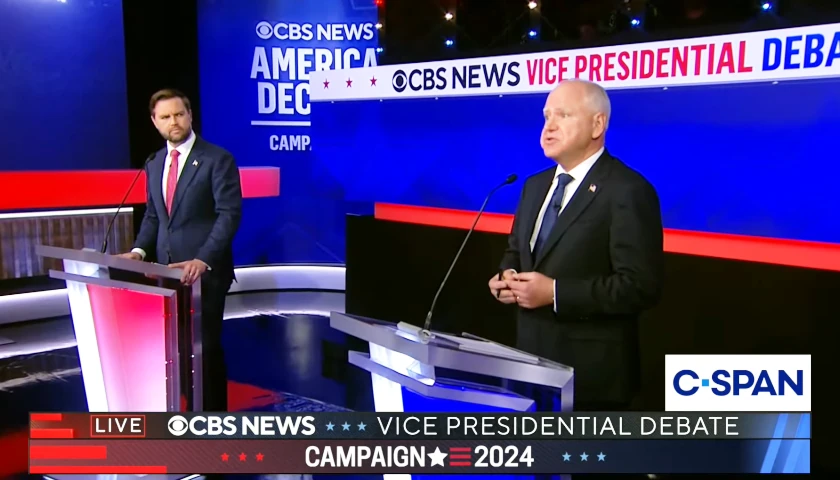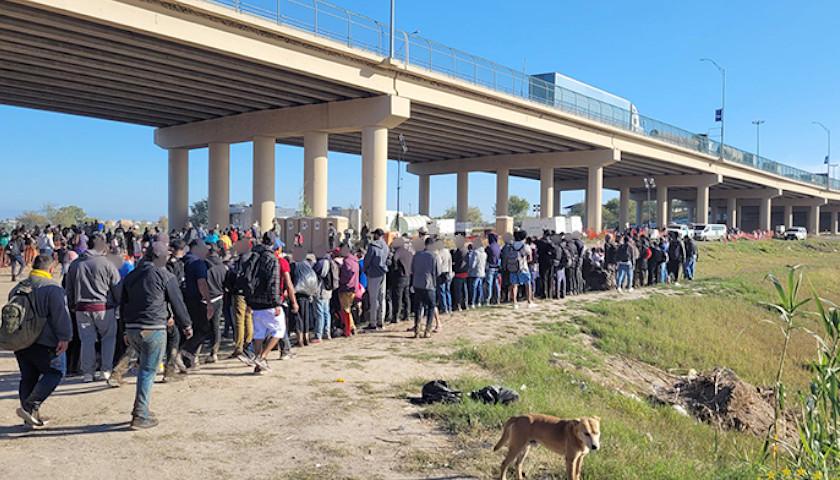Wednesday morning on The Tennessee Star Report with Michael Patrick Leahy – broadcast on Nashville’s Talk Radio 98.3 and 1510 WLAC weekdays from 5:00 am to 8:00 am – host Leahy and all star panelist Ben Cunningham were joined on the newsmakers line by Wilson County Commission Chair, Bobby Franklin.
During the second hour, Franklin described the situation the other night in the Wilson County Commission meeting where it was voted to indefinitely table the resolution that would refuse refugees from being dumped into their county.
He speculated that perhaps there was just too much on the agenda coupled with confusion and added that he was concerned about the program which creates a mandate on communities who already have their fair share of financial problems.
Franklin stated, “If the federal government wants to relocate people in communities, at the very least there needs to be some sort of revenue on that side. Especially a county that is struggling with growth like we are. And we are struggling.”
Leahy: Now we are joined on the line by Wilson County commissioner Bobby Franklin who’s going to try to explain what happened in Wilson County the other night when the majority of the members of that commission kind of punted or caved to the left depending on how you want to read it and decided to postpone indefinitely a vote to say no to the refugees. Welcome to the Tennessee Star Report this morning Bobby.
Franklin: I didn’t know I was going to be tasked with such a steep thing (Leahy laughs) as to explain why Wilson County did this. I can tell you that I do not know. We seldom ever vote not to vote on something. It’s very unusual and I can only speak for myself. It goes through the committee process. There were a lot of commissioners that attended that committee. They didn’t make any real comments one way or the other.
Leahy: In the committee hearing right?
Franklin: That’s right. And so I guess between the committee hearing and the recommendation to go before the full board, members must have either changed their minds or didn’t look at the issue. There was quite a bit on our agenda that night. I guess it could be as simple as not paying attention. I don’t know. I didn’t have enough information. But again I’m speculating.
Leahy: Let’s go to the chronology here. The legislative committee considers the resolution. Tell us what the resolution said, Bobby.
Franklin: Well it was essentially opting out of the refugee relocation for our county. It was essentially just a statement to our representatives at the state. You know, when we’re in session nobody is safe. You never know what they’re going to do. Our committee doesn’t meet often.
But when they convene we try to decide if there are issues that we need to weigh in on as a body. Sometimes it’s better to let your representatives know and something may not pass if it means a lot to a certain area. So that’s what this was. And it isn’t as much about people not coming to our county.
We’re the fastest-growing county in the state of Tennessee. People are going to still come to our county. It’s more about how are we going to pay for this. It’s a huge underfunded mandate and it’s a lot to wrap your mind around. And so that maybe the reason we voted not to vote. (Laughs)
Leahy: Are you the chair of the legislative committee?
Franklin: I am. I am the chair.
Leahy: They voted five to nothing on January 15th and to send it on for full consideration by the Wilson County Commission. But I’m told, and this is a little bit astounding to me, this is a very important resolution. I’m told that there was virtually no discussion of the merits of the resolution. Is that true?
Franklin: Well, there was a little bit. I think the discussion that did take place was that it isn’t an issue for us to consider.
Leahy: Who made that argument? And why did they make that argument?
Franklin: You know, I apologize. The ones that made that also made the argument early on about the second amendment sanctuary resolution that we took up next and passed.
Leahy: Right.
Franklin: And so, I don’t know. It could be a lack of information. It could be that they just didn’t want to vote on it. Didn’t want to be seen as voting one way or the other. For us, it’s a complicated issue to debate on the floor of a full-bodied county commission.
There is a lot to this and this is a problem that hasn’t been solved by our nation’s best politicians in Washington for what 35 or 45 years? Our immigration and refugee problem is a large one and I really don’t know why the county voted not to vote.
Leahy: We’re hearing reports, and you tell me if this is true. We’re hearing reports that virtually all of the 25 county commissioners were inundated with communications by email and perhaps otherwise from out of stater’s or out of area folks. Left-wingers from the TIRRC and others from the New York state etc. telling them that they were bad people if they voted for the is resolution. I’m just kind of paraphrasing. Is that true?
Franklin: I received several hundred emails. They were all the same email. I’m not sure if the rest of the commissioners did. I sense they may have. Oddly enough none of the emails asked me to opt into the (Laughs) It was all the same email and essentially asking to vote me to vote no to opt-out.
I found it interesting that it was important enough to for us to receive that many emails to opt-out of something. But I received zero saying it was a good idea to opt-in.
Leahy: The broader question is, this is a county-level decision. This is your county. Wilson County. What’s going on when people from Brooklyn, New York and all around the country in an orchestrated effort are trying to intimidate you to vote for more refugees or to not say we don’t want to postpone the vote on saying no to refugees. How do you respond to that?
Franklin: Well, we didn’t do what the letter asked. No one voted no. The county commissioners that I work with are not easily intimidated. I don’t think it was that at all. I think what may have happened and it’s purely speculation on my part. All of a sudden something a group didn’t pay a lot of attention too.
And then when it came time to actually cast their vote they had so much information thrown at them. Does that make sense? I don’t know. It’s just pure speculation on my part. But that could be. But again, the letter asked us to all vote no. We didn’t do that.
Leahy: In effect though in the short term it had the same effect as voting no. Do you see this issue coming up again Bobby?
Franklin: It could. I’m not going to necessarily bring it back as chair of the legislative committee. We don’t want to bring things to the table that we don’t have a firm opinion on anything. We don’t want to waste the commissions time. Depending on what the state does. I think there may be a bill or two filed on this there.
Leahy: Yeah, I know there is a bill filed in the House and I think also in the Senate which basically says, we disagree with the governor’s decision to say yes to refugees. I know that’s there.
Franklin: If the will of the legislative committee is to weigh on that to support that or not to support that even, it could come back in that form. I typically am not going to bring something back to the commission immediately like this. I wouldn’t be talking to you had we voted it down. I don’t debate it anymore.
Leahy: It’s a done deal, right?
Franklin: It’s a done deal. But this wasn’t so here we are. (chuckles)
Leahy: How long have you served on the Wilson county commission?
Franklin: I’m in my sixth year and we’ve maybe tabled two or three issues in those six years total. It’s a very rare occurrence.
Leahy: How much time do you spend working on issues as a county commissioner? Is it an exorbitant amount of time? How much time do you spend?
Franklin: It varies. It could be inundated. It depends on the month and the issues at hand. This was a very busy month. It was a large busy agenda. We were there very late. A lot was brought up about a lot of things. It was a heavy month. To answer your question. I spend anywhere from 10-30 hours a week sometimes when it’s very very busy. It could be more.
Leahy: Ben Cunningham has a question for you Bobby.
Franklin: Sure. Hi Ben.
Cunningham: What kind of compassion are you seeing from your constituents on this issue? How motivated is the general public and your voters? What are you hearing from them?
Franklin: I do door knocks every now and then. It kind of startles the community when there’s not an election. (Cunningham laughs) I did go knock on doors. And I did that in some of the neighborhoods. The ones that didn’t think I was a salesman and actually came to the door were pretty much of the mind that it’s an unfunded mandate.
If the federal government wants to relocate people in communities, at the very least there needs to be some sort of revenue on that side. Especially a county that is struggling with growth like we are. And we are struggling. We view growth as a good problem, but its still a problem. You have to build schools and pay your teachers. And buy firetrucks.
Leahy: Normal stuff.
Franklin: Normal stuff. And something like this is on top of that is very hard to wrap your mind around especially when you don’t necessarily get the bill for this all on one piece of paper. It comes in a variety of ways.
Leahy: Bobby Franklin, Wilson County Commissioner, thanks for joining us. Will you come back?
Franklin: I will.
Listen to the second hour:
– – –
Tune in weekdays from 5:00 am – 8:00 am to the Tennessee Star Report with Michael Patrick Leahy on Talk Radio 98.3 FM WLAC 1510. Listen online at iHeart Radio.
Photo “Wilson County Courthouse” by Ichabod. CC BY-SA 3.0.






Im sorry to say that was a pathetic answer. At least he voted against tabling it, but the subject is quite simple and straightforward. Wilson County residents do not want to pay for replacement migration.